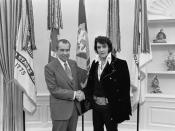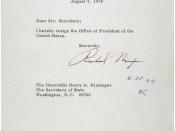Looking at the political and social outcomes of the end of the war in Vietnam I have learned that there are varying views on the outcomes of the end of the war. The Vietnam War cost American tax payers about $150 billion. Over two million men and women served during the war about 58,000 were killed as a result of the war. Many soldiers came home disabled for life, some lost limbs and others were poisoned by chemicals, like Agent Orange. Others returned from the war addicted to drugs and many suffered mental problems as a result of their participation in the war. Veterans of Vietnam were often ignored, shunned, and even discriminated against by the public and their government. "Both hawk and dove politicians did not vote money for governmental programs that would help the vets" (Vassar.edu, n.d.). A memorial to the Vietnam vets was not erected until 1982, almost ten years after the war ended.
"Many considered the Vietnam War a loss for American prestige and influence in the world" (Vassar.edu, n.d.). Many people became dissatisfied with a civilian government that interfered with the military operations of the war. Future Presidents would learn the lessons from the Vietnam War. The anti-war demonstrations against the war seemed to cause a separation between generations. In some, there was a definite loss in patriotic feeling for the United States. Many felt the government did not handle the situation wisely and even lied to the American public. The Vietnam War was a very costly war, socially, economically, and politically.
Vietnamization of the war was one policy that Nixon attempted during the Vietnam War, "which involved a carrot and a stick" (Davidson et al., 2002). "On its own initiative, the United States began gradually withdrawing troops as a way to advance the peace...


